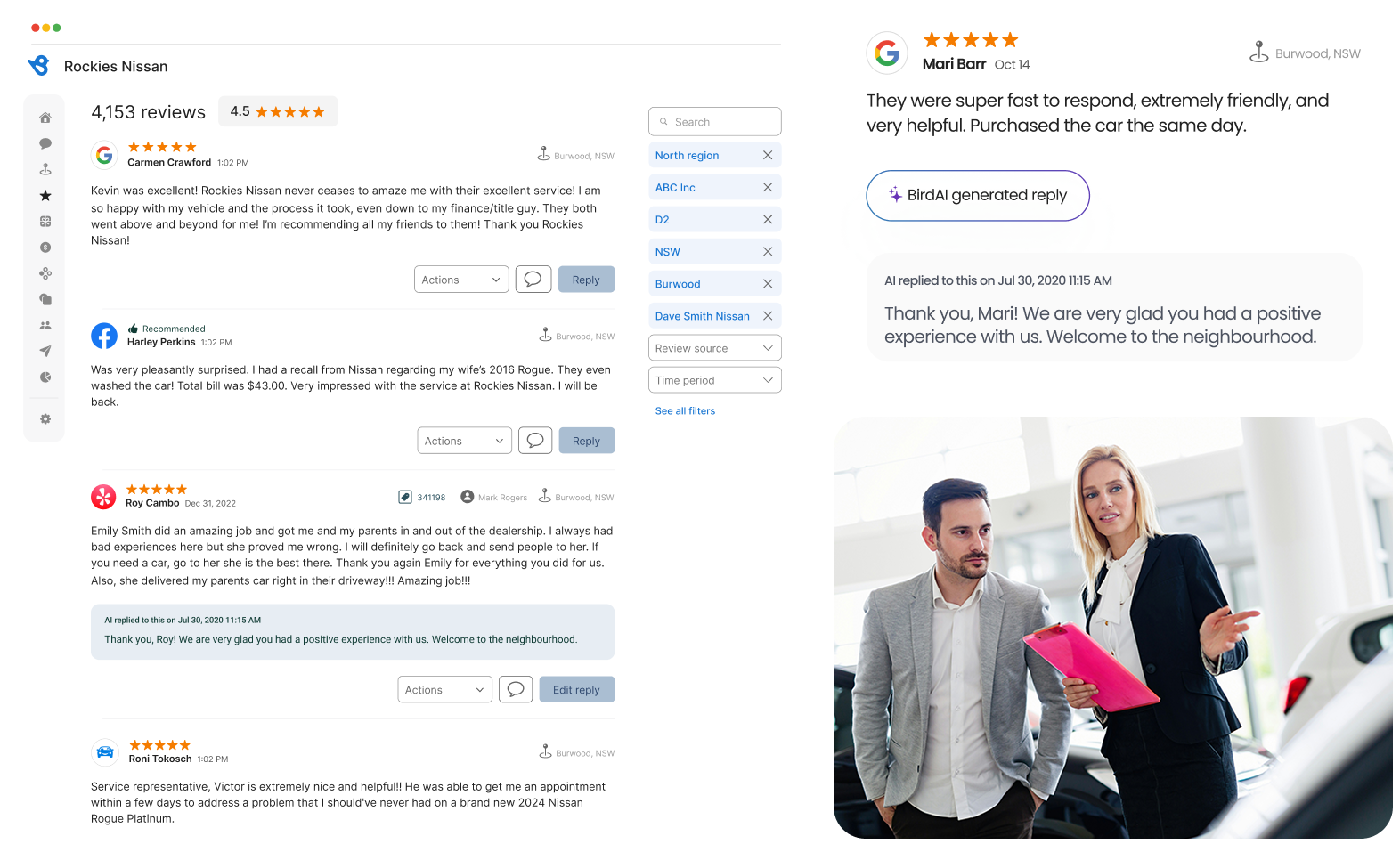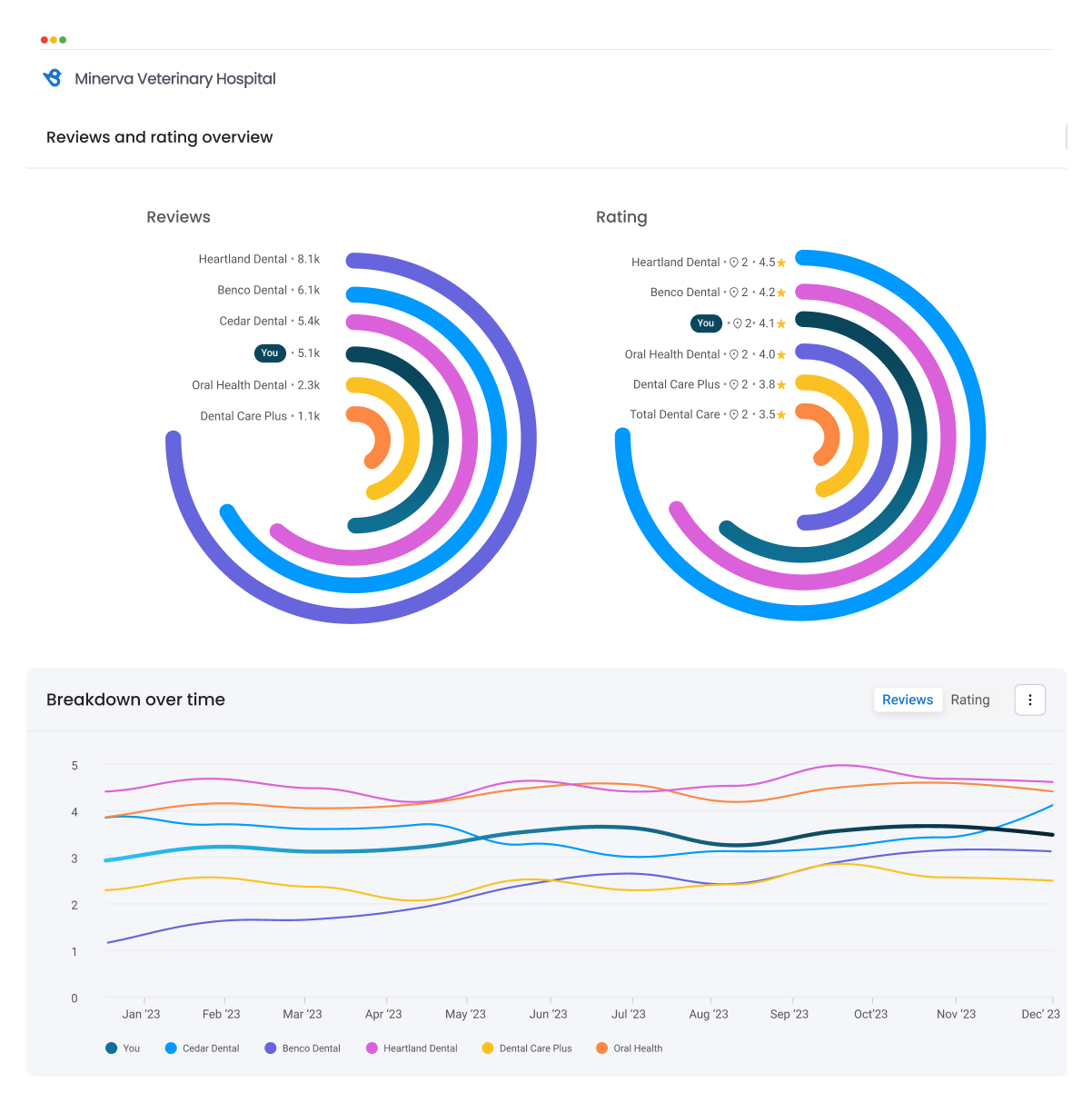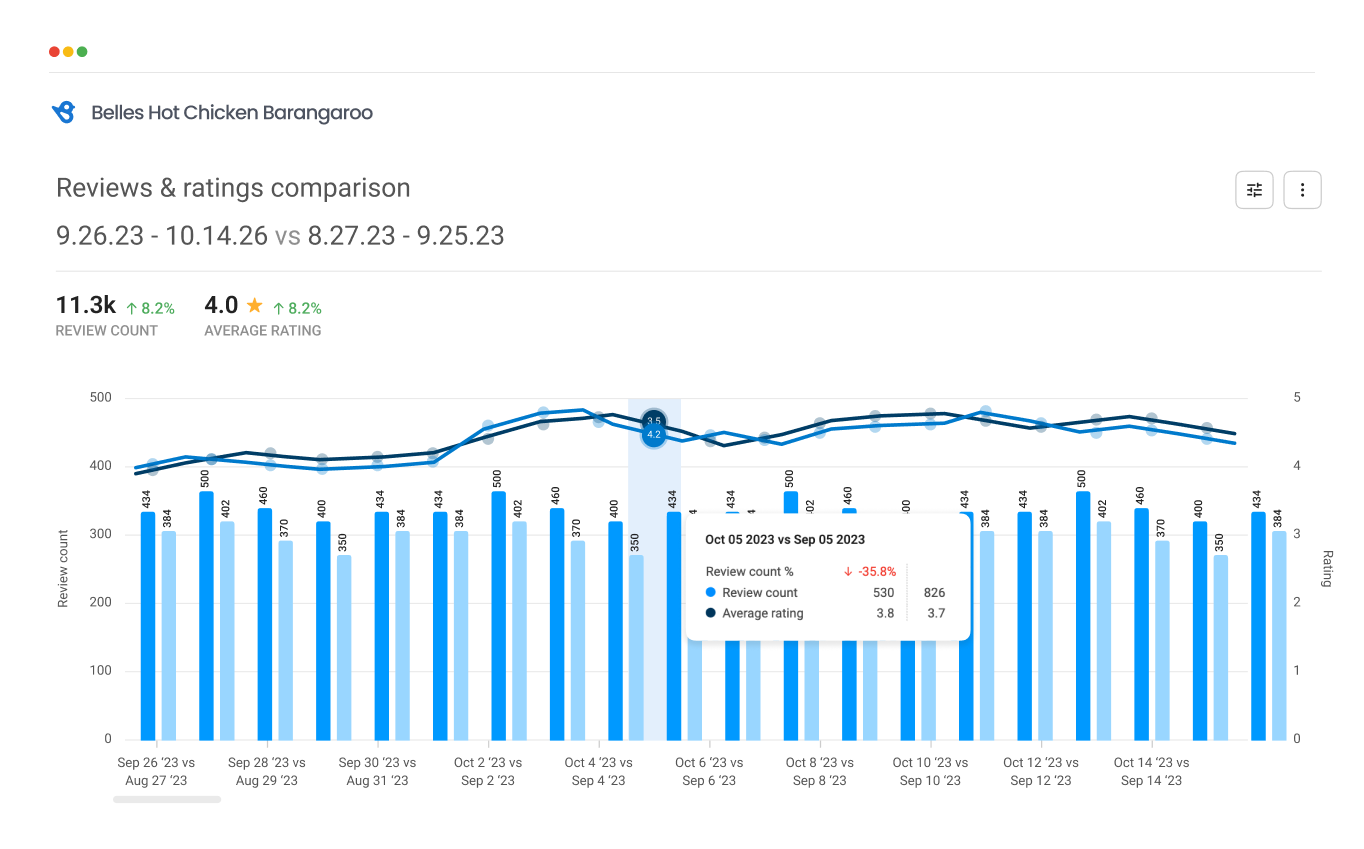Real estate reviews in Australia have shifted from being a nice-to-have to a must-have for businesses looking to thrive. However, the real challenge lies in ensuring that these reviews truly reflect the quality of your service.
With countless review platforms offering feedback ecosystems, knowing which ones can be relied on is tough. Maybe you’ve come across Google reviews for real estate agents that feel too good to be true or received negative feedback that doesn’t match the service you delivered. It begs the question: what’s real and just noise?
You’re not alone if you’ve ever felt frustrated or overwhelmed by the sheer volume of conflicting opinions. In this blog, we’ll navigate the world of real estate reviews in Australia, how to identify trustworthy feedback, and the one tool that can help you stand out and stay in control.
Straight to the point💡
The truth about real estate reviews in Australia is that they’re not always what they’ve ever faced. Sorting through the noise to find genuine feedback. Luckily, with the right tools like Birdeye’s review management you can cut through the clutter and make confident, informed decisions.
Table of contents
- Why do real estate reviews matter in Australia’s property market?
- How do you spot genuine real estate reviews?
- What are the red flags, and how do you spot fake real estate reviews?
- Are negative real estate agent reviews helpful for the business?
- How Birdeye’s GenAI tools help you manage real estate reviews in Australia
- FAQ on real estate reviews in Australia
- Elevate your real estate reputation with Birdeye Reviews AI
Why do real estate reviews matter in Australia’s property market?
Real estate agent reviews are crucial in building trust and credibility, especially in a competitive market like Australia’s. Buying or selling property is one of the biggest financial decisions most people will ever make—so it’s no surprise that clients are cautious and selective.
Gone are the days when flashy marketing or a slick brochure could seal the deal. Today’s buyers and sellers are doing their homework, and online reviews are one of the first things they check when choosing a real estate agent or property manager.
Think about it: just as we check reviews on Google before dining out or purchasing a product online, property buyers and sellers are now doing the same for real estate agents to check their reliability and track record. A single review can give them insight into what it’s like to work with you, making them feel more secure in their decision.
As the saying goes, “You never get a second chance to make a first impression.” In many cases, that first impression is shaped by online reviews and others' experiences.
But how can reviews help you in the long run? Let’s dive into how they directly impact your business.
Building trust through reviews
As your reputation grows through reviews, you’re building more than just a collection of comments—you’re building trust. Homebuyers or sellers can feel more confident about working with you when they see multiple positive reviews.
These act as social proof, showing that you’ve successfully helped others in similar situations. It’s the digital equivalent of a personal recommendation—the strongest form of marketing.
For example, if someone searches for a property in Sydney and sees your name paired with glowing reviews, they’re more likely to contact you. Likewise, past clients may mention your expertise in certain areas, helping potential clients see if you specialize in their desired property type or region.
The right real estate agent can make a massive difference in a client’s experience. Reviews can help prospects find the right agent to meet their needs, from helping them buy a home to navigating the complexities of selling.
Must read: 10 Best review samples for real estate agents to drive more referrals
Directly influence the client’s journey
Real estate reviews aren’t just a marketing tool—they directly influence decisions. For buyers, they offer a glimpse into your expertise, quality service level, and the overall process. For sellers, reviews demonstrate your market knowledge and ability to deliver results.
Consider this scenario: A potential buyer is interested in two properties in the same area. Both properties are on rent, priced similarly, and offer the same features.
However, one agent has dozens of glowing reviews that speak to how smooth the buying process was, while the other has sparse reviews, with a few complaints about communication.
Which real estate agent will the buyer choose? Most likely, it’s the one with a proven track record of success. The positive reviews provide reassurance that the agent can deliver.
Reviews as a tool for continuous improvement
It’s not only about gathering positive reviews; it’s also about learning from them. Every review—positive or negative—provides valuable insight into your strengths and areas for improvement in managing your property online. Negative reviews, though difficult to read, present an opportunity to grow.
Effective real estate reputation management isn’t just about quantity; it’s about the quality of feedback. Reviews that detail specific interactions, like responsiveness or negotiation skills, give potential clients a clearer picture of what they can expect. This level of personalization helps build trust and reassures clients that they are making the right choice.
Moreover, reviews help property managers and real estate agents stay on top of their game in any location by offering feedback on what’s working and what’s not. Whether you’re managing rental properties, helping clients with their sales, or offering advice to home buyers, reviews can improve your service quality.
Now that we’ve covered the importance of reviews, the next challenge is identifying genuine feedback amidst the noise. Not all reviews are left with the same intent; unfortunately, some can be misleading or downright fake. So, how can you differentiate genuine reviews from the rest? Let's explore this.
How do you spot genuine real estate reviews?
When browsing reviews, it’s crucial to differentiate between genuine feedback and fake or misleading reviews. Trusting the wrong source or relying on fabricated opinions could impact the credibility of your real estate business and mislead potential clients.
Let’s break how do you spot the real reviews from the fake ones down:
What makes a review genuine and reliable?
Genuine answers can guide future clients with valuable insights into your real estate business’s practices. They give real clients a chance to share their positive or negative experiences and help others make informed decisions.
Here’s what you should look for:
Verified users
Trustworthy reviews are often from verified clients—people who have used your services and bought or sold properties with you. Platforms that allow users to verify their identity ensure that the reviews come from actual customers. A review from a ‘verified buyer’ who has interacted with your current listings has more weight.
Platforms like Google Business Profile or RateMyAgent (for global real estate platforms) offer a “Verified” or “Purchased” tag on reviews, signifying that the person leaving feedback has truly transacted with the agency.
Detailed feedback
A good review provides more than just a quick comment. Look for reviews that go into detail about the house experience, discussing specific aspects like communication, negotiation, or market knowledge. The more context a reviewer provides, the more reliable their feedback is likely to be.
A generic “Great service, would recommend!” isn’t as helpful as one elaborating on specific aspects of the process, such as the agent’s communication, market knowledge, or negotiation skills.
Example of detailed feedback:
“Working with Sarah was an absolute pleasure from start to finish. She took the time to understand what we were looking for, offered honest advice, and guided us through every step of the buying process. Her communication was always clear and timely, and she made what could have been a stressful experience feel smooth and manageable.
Thanks to her dedication and sharp negotiation skills, we found the perfect home and closed at a price we felt great about. Highly recommend!”
Balanced perspectives
Genuine reviews often highlight both the positives and the negatives. It’s rare to see a perfect experience without some bumps. Reviews that are overly glowing or excessively negative may raise red flags.
Balanced reviews tend to reflect the truth—they discuss the challenges while also appreciating the service’s strengths.
Example:
“Overall, the buying process went smoothly, but we did face some delays due to paperwork. However, the agent proactively kept us updated and resolved the issue quickly.”
Consistent patterns
When browsing reviews, look for consistent patterns across multiple sources. If several clients mention the same qualities or issues with your business, those are likely to be true indicators.
For instance, if a consistent theme of good communication appears across reviews, it likely reflects your team’s overall approach to client relationships.
Example:
"Every review mentioning John praised his patience and responsiveness, which aligns with the positive feedback we’ve seen across multiple platforms."
Now that we know what to look for in a genuine review, identifying fraudulent ones is just as important. Fake reviews can damage your reputation and mislead potential clients.
What are the red flags, and how do you spot fake real estate reviews?
While genuine reviews are valuable, identifying fraudulent ones is equally important. Fake reviews can come in many forms, including overly exaggerated claims, suspicious repetition, or the appearance of being written by someone with no real business knowledge. Here’s what to look for:
Over-the-top praise
Fake reviews often read like they’re scripted or written with an agenda. If a review sounds too perfect, it may be a red flag. Real reviews usually come with nuances and imperfections—like minor issues or areas of improvement—not just an unwavering, idealized perspective.
Example: “I’ve never had a better experience in my life! 100% perfect, I will never go anywhere else!” This could be too good to be true.
Using generic, vague language
Fake reviews often lack detail. They use vague language like, “Great agent, highly recommend,” without any specifics. They may even feel like they’re written by someone who doesn’t know much about real estate or the specific process the client went through.
Here’s a rewritten version that still keeps the vague, possibly fake tone, as you'd see in suspicious reviews:
"Amazing experience! Sarah really knew what she was doing. Everything worked out perfectly. Would definitely use her again!"
Suspicious frequency
Pay attention to the frequency of reviews. If you suddenly see a flood of five-star reviews posted within a short window, it could be an attempt to manipulate ratings. Authentic reviews are spread out over time and reflect genuine customer experiences.
Overuse of superlatives
Real reviews can be enthusiastic, but fake ones often use extreme superlatives, like “life-changing,” “the best thing ever,” or “completely flawless.” Genuine customers typically avoid using these types of absolutes.
Example: “The experience was beyond expectations, and I’ll never trust any other agent again!” This exaggerated language could indicate a fake review.
Unrealistic timing
Be wary of reviews that describe an overly short or unusually fast transaction process. While real estate deals can be quick, claiming an offer was accepted and closed within 24 hours is often a sign of a fake review.
Red flag example: “I found my dream home, accepted an offer, and closed the deal in just one day!”
This is unrealistic in most scenarios.
No matter how many quality reviews you’ve got or how great your service is, not every client will be fully satisfied. Sometimes, unhappy customers leave negative reviews, and it’s an inevitable part of the business—but they’re not the end of the world. In fact, when handled correctly, negative feedback can be a blessing in disguise. Let’s explore how.
Your Guide to All About Real Estate Reviews in Australia
Want to see the impact of Birdeye on your business? Watch the Free Demo Now.
Are negative real estate agent reviews helpful for the business?
We can’t ignore the fact that negative reviews will come. It’s part of any business, and real estate is no different. But here’s the thing: Negative reviews aren’t a death sentence—they offer a chance to show real people your commitment to improvement. Responding with empathy and solutions can turn dissatisfied clients into loyal ones. The key is how you handle them.
In fact, they can be a blessing in disguise if you handle them with care. You must take action to turn the situation around. Here are examples of dealing with negative real estate agent reviews in Australia.
5 examples of how to deal with negative real estate agent reviews in Australia
1. Respond promptly and professionally
The first step is to respond to the review as soon as possible. Ignoring negative feedback only compounds the issue. Acknowledge the client’s concerns politely and express your willingness to resolve the matter. Keep the tone professional, and avoid sounding defensive. Your response can speak volumes about your customer service skills.
Example:
"Thank you for your feedback. We're truly sorry to hear about your experience. We take our client’s concerns seriously and would love to discuss how we can make things right. Please contact us directly at [contact details] to address this."
2. Show empathy
Put yourself in your client’s shoes. Acknowledge their frustration and show empathy in your response. Often, people just want to feel heard. Acknowledging their emotions can diffuse tension and prevent the issue from escalating.
Example:
"We understand how frustrating this situation must have been for you, and we deeply regret that it led to a less-than-positive experience. Your satisfaction is our priority, and we're here to make it right."
3. Take the conversation offline
When dealing with complaints, moving the conversation offline as quickly as possible is best. Offer a phone call or a face-to-face meeting to resolve the issue. This demonstrates your commitment to solving the problem and avoids publicly addressing your business’s issues. It also allows you to offer personalized solutions.
Example:
Hey [Name],
Thanks for your review — I’d really like to chat with you one-on-one to understand what went wrong and how we can make it better. Give me a call at [Phone] or shoot me an email at [Email] when you have a moment.
We’re here to help!
– [Your Name]
4. Take responsibility and offer a solution
Even if the review seems unfair, it’s essential to show accountability. You don’t have to agree with everything the reviewer says, but acknowledge any shortcomings and explain what you are doing to improve the service. Offering a clear solution or a remedy helps reassure future clients that you care about their experience and are proactive about fixing issues.
Example:
"We understand that communication during the process could have been better, and we are taking steps to ensure that future clients receive timely updates. We also implement new protocols to improve transparency throughout the buying/selling process."
5. Learn from the feedback
Negative reviews can be an excellent source of constructive criticism. Look for patterns in the feedback. Are there recurring issues mentioned across multiple reviews? Use this as an opportunity to improve your practices and avoid similar problems in the future.
Example:
Hi [Reviewer’s Name],
Thank you for sharing this — I really appreciate your honesty. I’ve taken some time to reflect on your feedback, especially around [insert specific issue], and I can see how frustrating that must have been.
We’ve already started making changes to how we [insert changes], and your review played a big part in that. I'm truly sorry we missed the mark, but I'm grateful you spoke up — it’s helping us do better.
If you're open to a quick chat, I’d love to connect and learn more. Either way, thank you again.
Managing reviews effectively can make all the difference in maintaining a positive online reputation. This is where Birdeye’s GenAI tool, Reviews AI, comes into play. It offers an advanced, automated solution to streamline real estate review management in Australia and help your business stay on top of customer feedback.
How Birdeye’s GenAI tools help you manage real estate reviews in Australia
Birdeye leverages the power of artificial intelligence to analyze, organize, and respond to customer reviews automatically. This allows your team to focus on other tasks while ensuring that customer feedback is always addressed promptly and professionally.
Here’s how integrating Reviews AI can benefit your real estate business:
Automated review responses
With Birdeye’s 360° review management software, you can automatically respond to reviews without manually drafting responses. This ensures that every positive or negative review is acknowledged quickly. Timely responses to customer feedback can demonstrate that you value customer input, which can boost client trust and loyalty.

Let’s say a client leaves a positive review about how your agent guided them through a challenging property search. With Reviews AI, you can immediately thank the client and express your appreciation, ensuring the customer feels heard.
Sentiment analysis
Reviews AI’s Sentiment Score shows the real sentiment behind each review—whether it’s positive, neutral, or negative. This helps you prioritize responses based on urgency. If a customer’s review is negative or expresses dissatisfaction, you can address their concerns before they escalate into a bigger issue.

A review stating, “The process was slow and frustrating” might be flagged as negative, prompting your team to contact the client to resolve the issue quickly.
Identify key trends and market it
Birdeye’s review reports analyses individual reviews and aggregates feedback to identify common themes. For instance, if several customers mention slow response times or issues with paperwork, this information can help you pinpoint areas for improvement within your operations.
Birdeye’s review marketing capabilities also allow you to leverage positive feedback to boost your business. If clients frequently praise your agents for their timely responses, you can use this as a powerful selling point on your website, social media, or other marketing channels.

Review aggregation and reputation dashboard
Instead of hopping between platforms to monitor reviews, Birdeye’s real estate review generation capabilities aggregate them into one comprehensive dashboard. This allows you to see the big picture, whether it’s across Google, Facebook, or other real estate review sites, giving you a more streamlined and holistic view of your reputation.
You can check all reviews from platforms like Google My Business for real estate agents, Zillow, or local property listing websites in one place, helping you quickly address any emerging issues.
Generate reports and insights for continuous improvement
Reviews AI offers detailed review reports that help you analyze the effectiveness of your review management strategy over time. You can track key metrics such as review volume, average rating, and sentiment and identify which areas of your business receive the most feedback.
Based on the feedback, you may discover that your agents receive higher customer service ratings but lower market knowledge scores. This insight can guide training and development efforts to improve the areas where your business needs it most.

Check out Birdeye's recommendation of 75 profitable business ideas in Australia segregated by lifestyle, skills & real demand to start this year!
FAQ on real estate reviews in Australia
Focus on delivering excellent service, requesting reviews from happy clients, and responding promptly to all feedback.
Yes, positive reviews can improve your SEO, particularly for local searches, helping you appear higher in search results.
The best real estate review websites in Australia include Google, RateMyAgent, and realestate.com.au. These platforms allow users to share experiences and provide ratings for real estate agents and agencies, helping buyers and sellers make informed decisions.
To leave a review for a real estate agent, visit platforms like Google Business Profile, RateMyAgent, or realestate.com.au. Sign in, find the agent’s profile, and rate their service. Add detailed feedback about your experience, highlighting their professionalism, communication, and overall service.
Elevate your real estate reputation with Birdeye Reviews AI
As the real estate industry in Australia continues to evolve, managing and leveraging customer reviews has become an essential strategy for success. To stay competitive and build trust, here’s how you can use Birdeye’s Reviews AI:
- Automate responses by ensuring you stay engaged with your clients 24/7.
- Sentiment analysis to prioritize negative feedback and resolve issues before they escalate.
- Identify trends to pinpoint areas for improvement and enhance your services.
- Get real-time alerts to maintain an up-to-date understanding of your online reputation.
- Streamline real estate reputation management in Australia from multiple platforms into a single dashboard
- Generate reports to track your performance, identify strengths, and take actionable steps to improve areas.

Originally published









